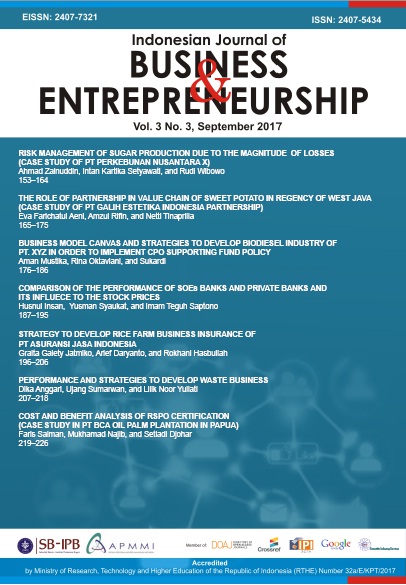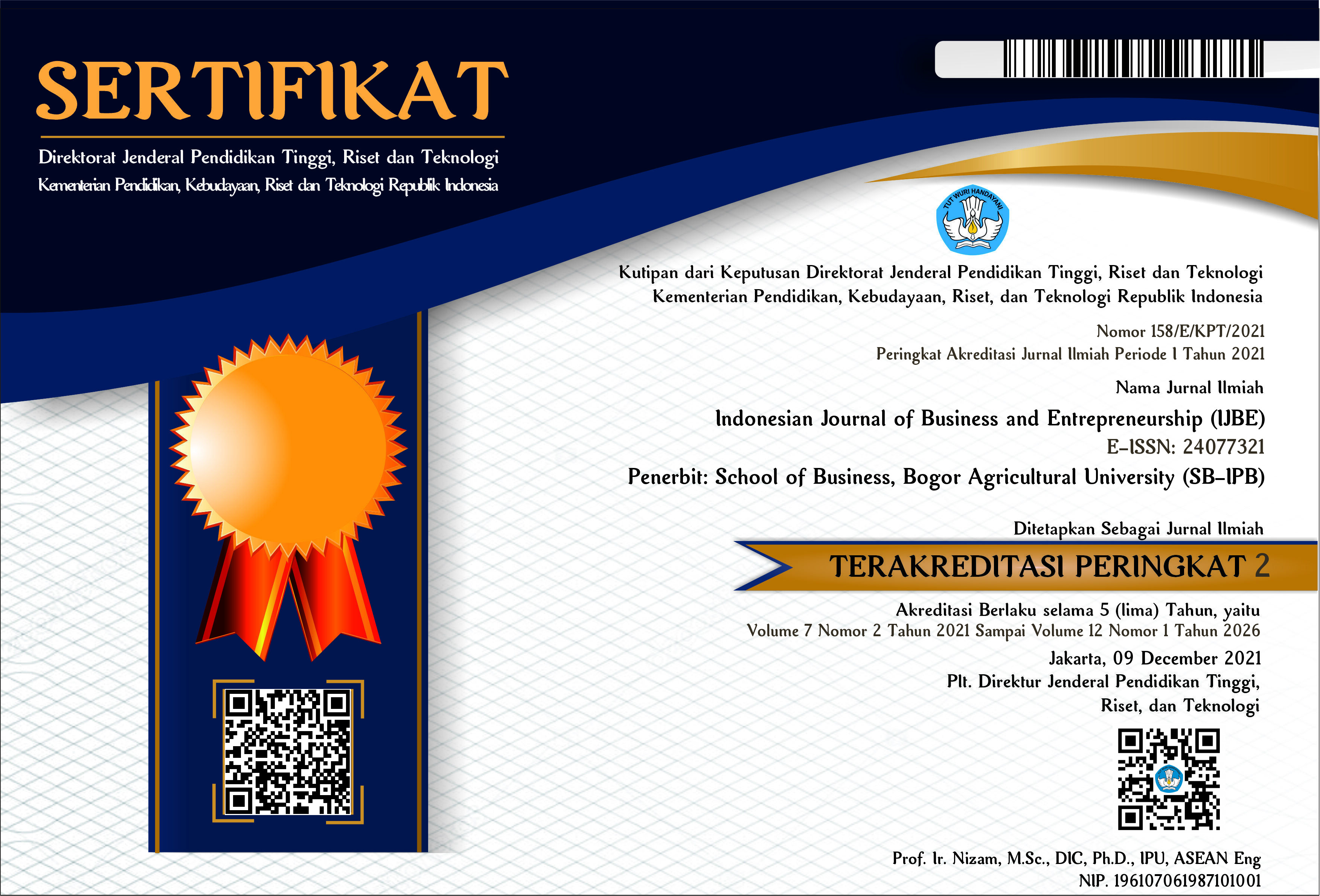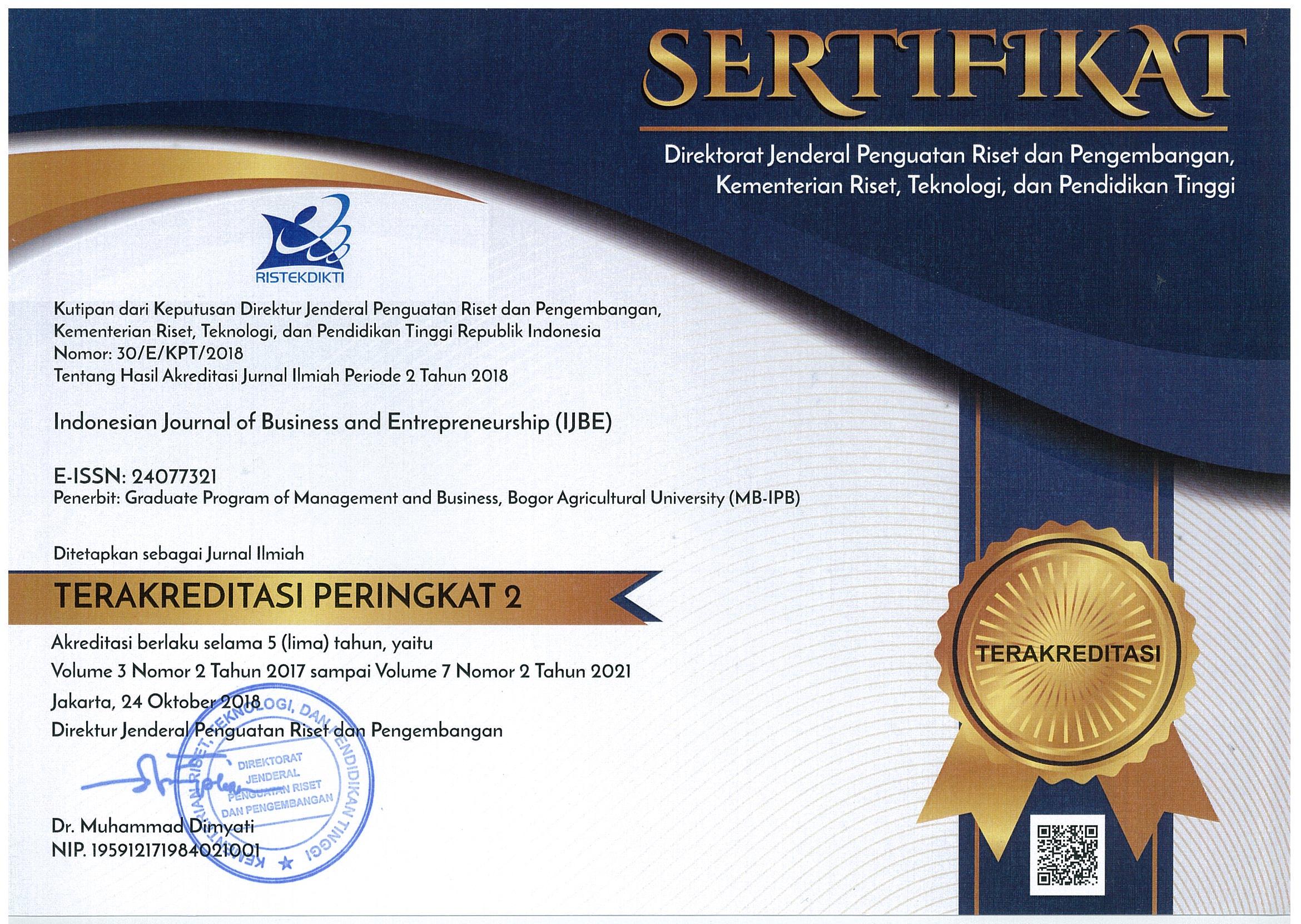Cost and Benefit Analysis of RSPO Certification (Case Study in PT BCA Oil Palm Plantation in Papua)
Abstract
RSPO is sustainable. It is one of many certification labels to justify a sustainable palm oil practice. The objective of this study is to identify monetary benefit and cost with the existing operating scenario of the company, or if the company is registered as the RSPO member. To identify the benefit or cost that might occur, this research compared the NPV, IRR, and benefit-cost ratio among the alternative scenarios. An ex-ante projective cash flow is simulated using the company’s historical financial report from year 2012-2016 to obtain monetary perspective of the amount of money required by the plantation to proceed with certification. Certification should cost the plantation around 466 billion rupiahs with only 66 billion rupiahs of additional income from CPO premium if the company is able to complete its certification by 2019. Total benefit of income obtained from selling the certified products of CPO and PKO may cover the certification expense which does not exceed the cost paid with the discrepancy of 331 billion rupiahs. This amount can be used to establish another palm oil plantation, create jobs and contribute to domestic products. However, the net monetary loss is close to the value obtained from timber upon land clearing, which was at 286 billion rupiahs. Being sustainable is probably never about monetary value but more about the responsibility of managing the sustainable oil palm plantation and the environment that must be taken care of.
Keywords: RSPO, oil palm plantation, cost and benefit analysis, oil palm in Papua, RSPO finansial benefit
Downloads
References
Abazue CM, Er AC, Ferdous Alam ASA, Begum H. 2015. Oil palm smallholders and its sustainability practices in Malaysia. Mediterranean Journal of Social Sciences 6:482–488. https://doi.org/10.5901/mjss.2015.v6n6s4p482.
Abdullah R. 2013. An analysis on trends of vegetable oil prices and some factors affecting. Oil Palm Indonesia Economic Journal 13:1–14.
Bank Indonesia. 2017. Kurs transaksi Bank Indonesia. http://www.bi.go.id/id/moneter/informasi-kurs/transaksi-bi/Default.aspx [13 April 2017].
Bansal P, Roth K. 2000. Why companies go green: a model of ecological responsiveness. Academy of Management Journal 43:717–736. https://doi.org/10.2307/1556363.
Basiron Y, Foong-Keong Y. 2016. The Burden of RSPO certification cost on malaysian palm oil industry and national economy. Journal of Oil Palm, Environment and Health 7:19–27.
Boardman AE, Greenberg DH, Vining AR, Weimer D. 2014. Cost-Benefit Analysis: Concept and Practice. 4th ed. New Jersey: Pearson.
FAO. 2015. FAOSTAT. Food Agric. Organ. United Nation.
Febrini N, Lubis SN, Kusuma SI. 2015. Dampak penterapan RSPO terhadap pendapatan di PT. Bakrie Sumatera Plantation, Tbk. Journal on Social Economic of Agriculture and Agribusiness 4:1–8.
Fritz M, Schiefer G. 2008. Sustainability in Food Networks. In: Agriculture. Bonn: GEWISOLA.
GreenPalm. 2017. Market Overview. http://greenpalm.org/the-market/market-overview [13 April 2017].
Hansen SB, Padfield R, Syayuti K, Evers S, Zakariah Z, Mastura S. 2015. Trends in global palm oil sustainability research. Journal of Cleaner Production 100:140–149. https://doi.org/10.1016/j.jclepro.2015.03.051.
Indriantoro FW, Sa’id EG, Guritno P. 2012. Rantai nilai produksi minyak sawit berkelanjutan. Jurnal Manajemen & Agribisnis 9(2):108–116.
Keraf AS. 2002. Etika Lingkungan. Jakarta: Penerbit Buku Kompas.
Kurniawati N, Glasbergen P, Offermans A. 2015. Sustainability certification and palm oil smallholders ’livelihood : a comparison between scheme smallholders and independent smallholders in Indonesia. International Food and Agribusiness Management Review 18(3):25–48.
Levin J, Ng G, Fortes D, Garcia S, Lacey S, Grubba D. 2012. Profitability and Sustainability In Palm Oil Production: Analysis of Incremental Financial Costs and Benefits of RSPO Compliance. Swiss: World Wildlife Fund (WWF).
Moreno-Peñaranda R, Gasparatos A, Stromberg P, Suwa A, Pandyaswargo AH, Puppim de Oliveira JA. 2015. Sustainable production and consumption of palm oil in Indonesia: What can stakeholder perceptions offer to the debate? Sustainable Production and Consumption 4:16–35. https://doi.org/10.1016/j.spc.2015.10.002.
Nasution MR. 2013. Analisis biaya dan manfaat pada sertifikasi RSPO bagi perusahaan kelapa sawit [tesis]. Medan: Universitas Sumatera Utara.
Nikoloyuk J, Burns TR, de Man R. 2010. The promise and limitations of partnered governance: the case of sustainable palm oil. Corporate Governance 10:59–72. https://doi.org/10.1108/14720701011021111.
Novelli E. 2016. Sustainability as a success factor for palm oil producers supplying the European vegetable oil markets. Oil Palm Industry Economic Journal 16:8–17.
Obidzinski K, Takahashi I, Dermawan A, Komarudin H, Andrianto A. 2013. Land Use Policy Can large scale land acquisition for agro-development in Indonesia be managed sustainably ? Land use Policy 30:952–965. https://doi.org/10.1016/j.landusepol.2012.06.018.
Paoli GD, Yaap B, Wells PL, Sileuw A. 2010. CSR, Oil Palm and the RSPO: Translating Boardroom Philosophy into Conservation Action on the Ground. Tropical Conservation Science 3(4):438–446. https://doi.org/10.1177/194008291000300408.
Phelps J, Hariyanti B, Sinaga AC, Dermawan A. 2014. Valuasi lingkungan di Indonesia. Brief 32 Oktober 2014.
Prafitri T, Rachmina D, Maulana TNA. 2017. The effect of working capital on the profitability of palm oil plantation companies. Indonesian Journal Of Business And Entrepreneurship (IJBE) 3(2): 111–120. doi:http://dx.doi.org/10.17358/ijbe.3.2.111.
PR Newswire. 2015. European Palm Oil Industry Sets Course for 100% Certified Sustainable Palm Oil by 2020. http://search.proquest.com/docview/1688705924/2098A706443D40BFPQ/2?accountid=32819 [7 September 2016].
Rifin A. 2010. Export competitiveness of Indonesia’s palm oil product. Trends in Agricultural Economics 3: 1–18. https://doi.org/10.3923/tae.2010.1.18.
Ruysschaert D, Salles D. 2014. Towards global voluntary standards: Questioning the effectiveness in attaining conservation goals. The case of the Roundtable on Sustainable Palm Oil (RSPO). Ecological Economics 107:438–446. https://doi.org/10.1016/j.ecolecon.2014.09.016.
Sutarta E, Rahutomo S. 2013. New Standard for FFB Yield of IOPRI’s Planting Materials Based on Land Suitability Class. Medan.
Svatoňová T, Herák D, Kabutey A. 2015. Financial profitability and sensitivity analysis of palm oil plantation in indonesia. Acta Universitatis Agriculturae et Silviculturae Mendelianae Brunensis 63:1365–1373. https://doi.org/10.11118/actaun201563041365.
Vijay V, Pimm SL, Jenkins CN, Smith SJ. 2016. The Impacts of Oil Palm on Recent Deforestation and Biodiversity Loss. PLoS ONE 11(7): 1–19. https://doi.org/10.1371/journal.pone.0159668.
Wisena BA. 2015. Analisis strategi daya saing industri kelapa sawit yang berkelanjutan [disertasi]. Bogor: Institut Pertanian Bogor
Wisena BA, Daryanto A, Arifin B, Oktaviani R. 2014. Sustainable development strategy for improving the competitiveness of oil palm industry. International Research Journal of Business Studies 7(1):13–37. https://doi.org/10.21632/irjbs.7.1.13-37.
World Bank. 2017. Global Economic Monitor (GEM) commodities. http://databank.worldbank.org/data/reports.aspx?source=global-economic-monitor-(gem)-commodities# [13 Apr 2017].








